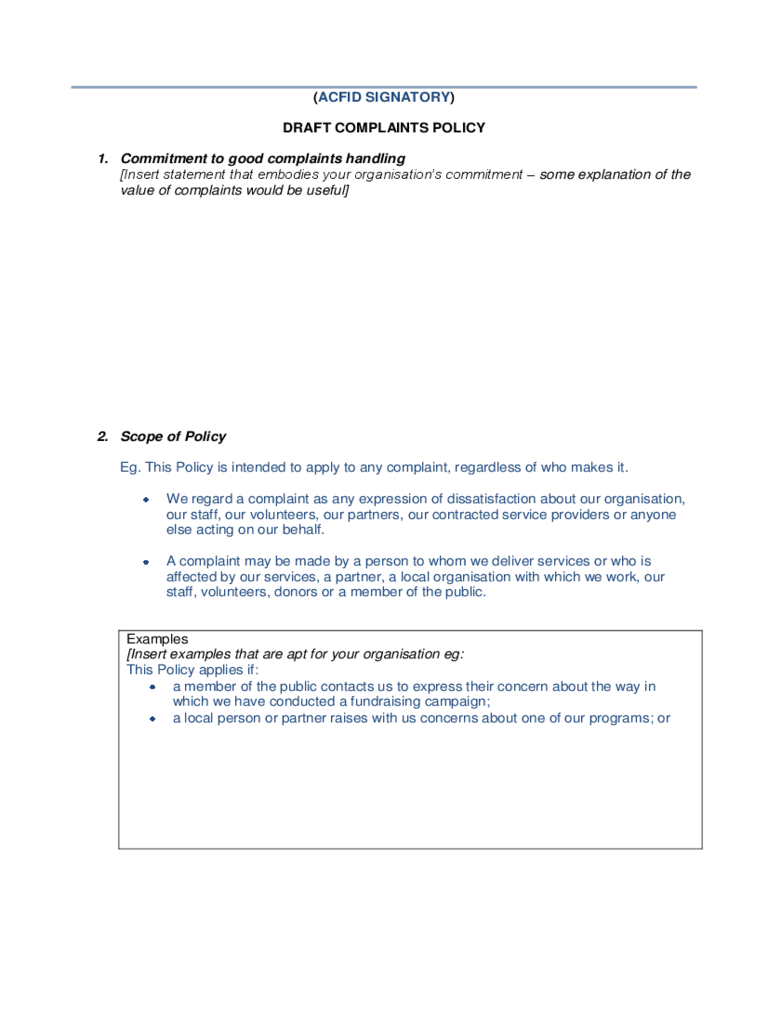Fillable Printable Draft Complaint Policy
Fillable Printable Draft Complaint Policy

Draft Complaint Policy

(ACFID SIGNATORY)
DRAFT COMPLAINTS POLICY
1. Commitment to good complaints handling
[Insert statement that embodies your organisation’s commitment – some explanation of the
value of complaints would be useful]
2. Scope of Policy
Eg. This Policy is intended to apply to any complaint, regardless of who makes it.
We regard a complaint as any expression of dissatisfaction about our organisation,
our staff, our volunteers, our partners, our contracted service providers or anyone
else acting on our behalf.
A complaint may be made by a person to whom we deliver services or who is
affected by our services, a partner, a local organisation with which we work, our
staff, volunteers, donors or a member of the public.
Examples
[Insert examples that are apt for your organisation eg:
This Policy applies if:
a member of the public contacts us to express their concern about the way in
which we have conducted a fundraising campaign;
a local person or partner raises with us concerns about one of our programs; or

ACFID Complaints Workshop – Resource Template
2
3. Publicising this Policy
[What will you do to ensure that those who want to complain understand how to do so and
what to expect? What is done to facilitate complaints from the field and complaints from
children or disadvantaged groups?]
4. How complaints may be made
[Set out how complaints can be made – ensure that every reasonable flexibility is afforded
to complainants to ring, write and email complaints or to raise concerns in person. Is there
capacity to provide online feedback?]
Examples
[Insert examples that are apt for your organisation]
5. How we will handle minor complaints
[Eg a telephone complaint that can be responded to in the initial call, a written complaint
that proceeds on the basis of a misconception that can readily be corrected? Do we have a
way of closing off complaints without merit?]
Examples
[Insert examples that are apt for your organisation]

ACFID Complaints Workshop – Resource Template
3
6. How we will handle complex complaints
[ie complaints that require acknowledgement, initial assessment and investigation and may
require remedial action eg. change to the way in which we operate, training, counselling or
disciplining of staff or volunteers etc. or even the involvement of regulatory/enforcement
authorities?]
Examples
[Insert examples that are apt for your organisation]
ACFID Complaints Workshop – Resource Template
4
7. Responding to and closing a complaint
[Who needs to approve a response? How will you communicate your full response to the
complainant for complaints not resolved on the spot ie orally, in writing, both? You will
need to take into account the different contexts in which complaints arise eg. in field
complaints and complaints made in Australia. How will you include disclosure about the
possibility of complaining to the Code of Conduct Compliance Committee? How will you
determine whether the complainant is satisfied? What will you do if the complainant is not
satisfied with your response?]
8. Our timeframes
[For complaints that are not resolved within 5 days, it is good practice to acknowledge the
complaint either by telephone or in writing. A 30 day timeframe might be long enough for
most complaints, with an obligation to update the complainant after 30 days if the complaint
hasn’t in fact been resolved?]
9. Confidentiality
[Statement that will not reveal complainant’s name or personal details to anyone outside
the organisation without the complainant’s permission]
ACFID Complaints Workshop – Resource Template
5
10. Recording complaint data
[A complaint register should be maintained. What fields will you need to have in the
register eg date of receipt, summary, type of complaint etc?]
11. Reporting about complaints
[Serious complaints (how will you define these?) will need to be immediately escalated in
your organisation. Minor complaints may just be reported at the end of the period eg. an
extract from the complaints register to the Management Team meeting. What reporting will
be made to the Board? What analysis will be provided with the complaints data?]

ACFID Complaints Workshop – Resource Template
6
12. Continuous improvement
[What will you do to monitor and review the effectiveness of your complaints handling and
ensure that this continuously improves and learnings from complaints handling are carried
through into the organisation?]
13. Resources
ACFID Code of Conduct D.6 Complaint-handling within signatory organisations
Australian Standard: Customer satisfaction – Guidelines for complaints handling in
organisations (IS0 10002:2004)
Other? (Note others mentioned by presenters/participants)



